1999-2004 (Return to Web Text-ures) |
Click Here to return to |
1999-2004 (Return to Web Text-ures) |
Click Here to return to |
Augustus Hemenway was one
of the most influential merchants of Boston. He was born in Salem in 1805, and
like many boys of that period he was obliged to go to work when he was very
young. His first position was as clerk in a small dry-goods store in
Charlestown, and later he was employed by Benjamin Bangs & Co., going out as
supercargo in their vessels. When he was fifteen years old, it is recorded, he
was earning $60 a year and his board. With the Bangs firm he began trading for
himself in a small way with the seacoast towns in Maine, then he branched out to
the West Indies, and by 1836 he was in business for himself under the firm name
of A. Hemenway & Co. He owned eight large ships, which he built for his own
business, under his own orders, and which plied to and from Valparaiso, where
he had his own warehouse and stores. The names of these vessels were "City of
Valparaiso," "City of Santiago," "Independence," "Magellan," "San Carlos,"
"Prospero," "Sunbeam," and "Quintero." He also owned the entire cargoes which
consisted of whatever American products he considered would be salable on the
west coast of South America, -- soap, candles, kerosene, refined sugar, boots,
shoes, etc.; lathes, shovels, picks, and other tools and machines, woollen and
cotton cloth; sewing-machines, organs, pianos, furniture, and other
manufactures. For the homeward voyages the ships were loaded with copper ore,
nitrate of soda, wool, hides, goatskins, etc. As all the cargo belonged to him,
he never had to advertise for freight.
One of his captains said that when his crew was taken on board in Boston, one of them was very drunk and noisy, whereupon the mate told him to stop his noise and go below. The man made some insulting reply, whereupon the mate seized a belaying pin, struck him a heavy blow on the head which brought the blood over his face, and knocked him senseless to the deck. a lady passenger, who saw it, was horrified at the sight, and hastened to the cabin. a few days later, when the ship had sailed, this lady came on deck and observing the man who had been belabored, at the wheel, steering the ship, exclaimed, "Oh, my good man, how is your head?" The man glanced at the compass and replied absent-mindedly to the puzzled lady, "East-north-east-half-east, Madam."
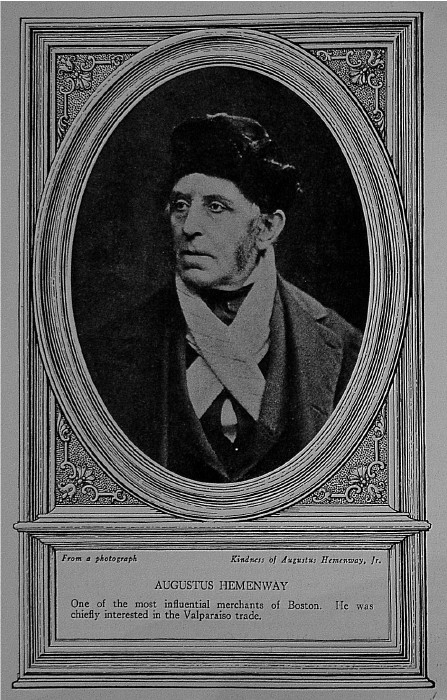
From a photograph Kindness
of Augustus Hemenway, Jr.
AUGUSTUS HEMENWAY
Another captain brought
home from Valparaiso a French shipmaster whose vessel had been sold. He had
with his baggage a quantity of fine French brandy. On the last day of the
discharge of the
cargo the Frenchman invited the custom-house officer on hoard to take a glass of
this brandy, which the officer said was the finest he had ever tasted. The
Frenchman asked if he would consider it a good thing to have in the house, and
asked for a memorandum of his residence. Soon after that a man came from the
cabin with a half-dozen bottles in a basket and started for the shore. Of
course, the officer could not see goods taken ashore until the duty was paid, so
he looked the other way. When he went home that night he was surprised and
disappointed at not finding the brandy there and discovered a few days later
that the address given to the man with the basket was that of one of the
Frenchman's friends, and not his own address. The custom-house official could
not say anything about the incident without showing his neglect of duty in
allowing the brandy to be landed.
Mr. Hemenway's quiet
manner of managing his affairs was appreciated by every one. One day the
stevedores' engine, at work on the wharf, threw off a mass of soot which was
blown into the office windows, covering the desks and papers. Mr. Hemenway spoke
to the wharfinger about it, who must have been a punster, for he replied, "I am
very sorry; we are always trying to suit you," and then proceeded with his work.
Besides his Valparaiso
business Augustus Hemenway owned an entire township in Maine, where he procured
pine-trees, floating the logs down to his own saw-mill at Machias. Here they
were cut into boards and loaded on his schooners for Cuba, where he owned a
large plantation and sugar-mill, in which he took a great interest. One winter
evening, while on his way from Sagua to the St. George estate, Mr. Hemenway was
captured by insurgents and held for ransom. The manager of the estate, who was
with him, was very much terrified, but Mr. Hemenway showed no fear whatever and
passed a good part of the night sitting on a log, smoking cigars, and
endeavoring to beat down the exorbitant demands made for his ransom, in which he
was largely successful. At daybreak he sent his manager, Mr. Bartlett, to the
bank, in Sagua, for the necessary funds, paid his ransom, then went quietly on
his way. Absolute fearlessness was one of his strongest characteristics. After
this adventure, however, he made it a point to go by train from Sagua to the
estate.
Mr. Hemenway was an
industrious, quiet, and unassuming gentleman, and was a most successful
merchant. He was so conscientious about his business that he was seldom willing
to leave details to others. sometimes even superintending the loading of his
vessels. He married Mary Tileston, the daughter of Thomas Tileston of New York,
who was one of the foremost merchants of that city From 1820 until his death in
the late sixties.
There was another Hemenway in the family who was a noted captain, and it was said of him that he was such a good pilot that he could "take a ship to the White Mountains, gather a freight of cool air and return on time with his eyes shut."
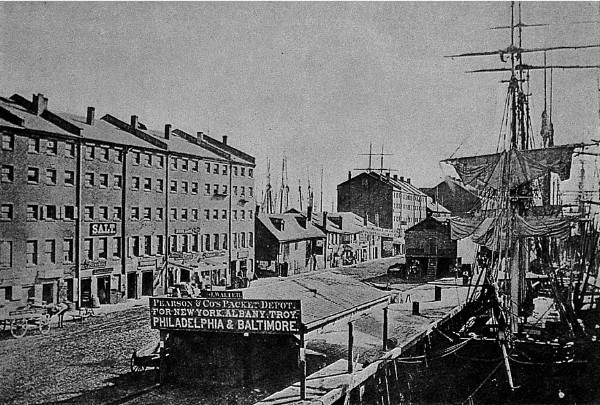
From a photograph
Kindness of B. C. Bradlee
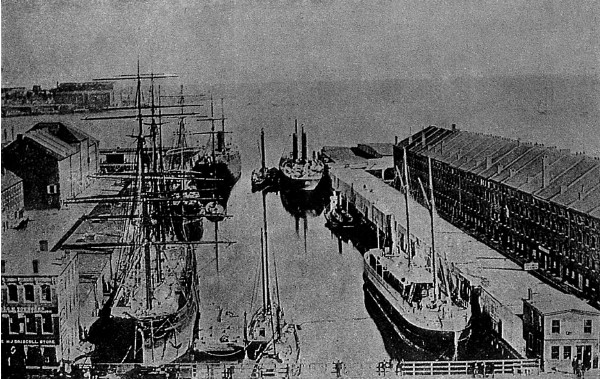
From a photograph
Kindness of B. C. Bradlee
LONG AND CENTRAL WHARVES IN 1873
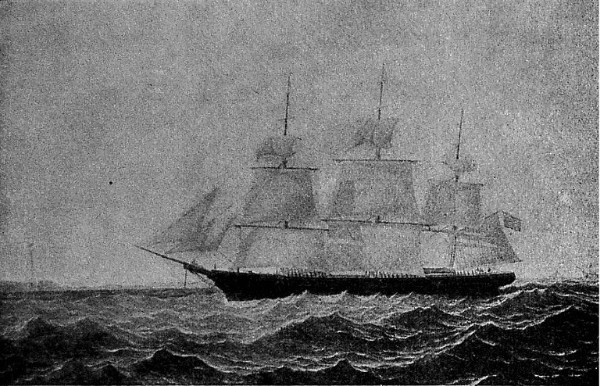
From a painting owned by Barclay Tilton,
Esq.
"DASHING WAVE," OWNED BY
STEPHEN TILTON & CO., ENTERING BOSTON HARBOUR IN 1855
The Tilton firm has had offices in the same location, 10 Central Wharf, -- now to Milk Street, -- since 1830. The ships of the firm used to dock opposite the counting-house.
STEPHEN TILTON & CO. WITH AN ACCOUNT OF THE THRILLING
ADVENTURE OF THE TILTON FAMILY AGAINST INDIANS.
The firm of Stephen Tilton
& Co. was composed of Stephen and his two sons, Stephen, Jr., and Joseph B.
Tilton, the latter the father of Barclay Tilton, and their offices since 1830
have been at the same location, formerly 10 Central Wharf, now 10 Milk Street.
The old sign over the door is still there, although no longer legible. The firm
had started business a few years before in Newburyport. The ships of the firm
used to dock right opposite the "counting-room," the dock itself being situated
where the present Chamber of Commerce is. Central Wharf in the early days was
the continuation of what is now Milk Street, below India Street. The Tilton firm
at first traded with the West Indies and later with Calcutta, where some of the
cousins and uncles lived as agents, handling chiefly tobacco sent out there from
Virginia. The two best known of their ships were the "Dashing Wave" and "Water
Witch." When the "Dashing Wave" was converted into a barge a shot from the
Confederate cruiser "Alabama" was found in her timbers. At present writing she
is still used as a barge. The logs of the firm's ships were found in the offices
at 10 Central Wharf.
The grandfather and uncle of Stephen Tilton had a thrilling experience with some Penobscot Indians, which is most interesting, and which has been described in "A Brief Narrative or Poem, giving an account of the hostile Actions of Some Pagan Indians towards Lieutenant Jacob Tilton, and his brother Daniel Tilton, both of the town of Ipswich, as they were on board of a small vessel at the Eastward; which happened in the summer-time, in the year 1722. With an account of the Valiant Exploits of the said Tiltons, and their victorious Conquest over their insulting enemies." This narrative was discovered stowed away in the Newburyport Town Hall.
The two Tilton brothers
went off on a fishing voyage, and, to quote the first few lines of this poem: --
The warriors ran down into
the cabin and demanded to know the reason why the white men retained one of
their Indians as a hostage, to which Lieutenant Tilton expostulated that
|
We poor fishermen are not to blame." |
The Indians with
considerable difficulty then managed to bind their two captives, and danced
around them, flourishing their long knives. Presently two of their number rowed
ashore to carry back the good news of the capture, leaving on guard the other
four, who felt so certain that they had their prisoners secure, that they left
them and began to plunder the ship of all food and valuables on board. The
following lines plainly describe what ensued:
|
He saw a splitting knife that was near by, To which he goes and turns his back about Eyeing them well, lest they should find him out: And so he works said knife into his hand, With which he cuts his line, but still doth stand. Although two of said Indians him ey'd, They did not know but he remained fast ty'd. Two of said Indians were, plundering, Down the Forecastle while he did this thing, The other two so watchful and so sly, And on him kept a constant Indian eye, That he stands still waiting till he could find A time when they did him not so much mind; But when for plunder they to searching goes, Then his contrivance presently he shows: He to his brother Jacob runs with speed, And cuts his line; now both of them are freed. The Indians now alarmed, hereby, In Indian language, made a hideous cry: Crying Chau hau, chau hau; for they espy'd, That both these Englishmen were got unty'd; Like roaring Lyons with an ax and knives Made violent assaults to take their lives; But God who had determined to save, Undaunted courage unto them He gave; That they with such a manly confidence. Altho' unarm'd stood in their own defence; And tho', they had from these blood-thirsty hounds Received many dismal stabs and wounds, While in their skirmish blood was up and hot, No more than Flea bites them they minded not, Said Daniel still retained his splitting knife, Who nimbly ply'd the same and fit for life; With one hand fended off the Indian blows, And with the other crossed the face and nose Of Captain Sam, until his pagan head Was chop'd and gash'd, and so much mangled; Bits of his Indian scalp hung down in strings, And blood run pouring thence as out of springs." |
Jacob Tilton was able to hurl one of the wounded
Indians overboard.
|
And brought his hand about his Indian Ham, And to the vessel side he nimble goes, And his black carcass in the water throws." |
Jacob then threw the third over the side, the
fourth deciding that he would jump of his own accord. Two of the wounded men in
the water then climbed on board a canoe which was lying alongside the vessel.
The poem goes on to say: --
|
Unto the same said Jacob Tilton run, Catching it up to shout them, it mist fire, Which disappointed him of his desire, He catching up a stout great setting Pole, With all his might he struck them on the jole, Giving them many blows upon the head; Over the turns, and sunk like any lead. We think our Country now at Peace might rest, If all our Indian foes were thus supprest. Let God the glory of such conquest have, Who can by few as well as many save. Then having thus dispatch'd the savage crew, They presently consulted what best to do. Three more Canoes ladden to the brim With Indians as deep as they could swim, Came padling down with all their might and main Hoping the valiant Tiltons to retain. Daniel, which was both nimble, stout and spry, He fetch'd an ax, and running presently, He cuts the cable; then they hoist their sail, Leaving their Neighbors, that they might bewail Over their Governor who in dispute, Had term'd himself as great and good as Shute.* After they had from foes escaped thus, They sail'd and came into Mintinnicus" (now Matinicus). |
|
"Their course for Ipswich town they next
contrive,
|
FORT HILL
1867. BOSTON, MASS. 1892.
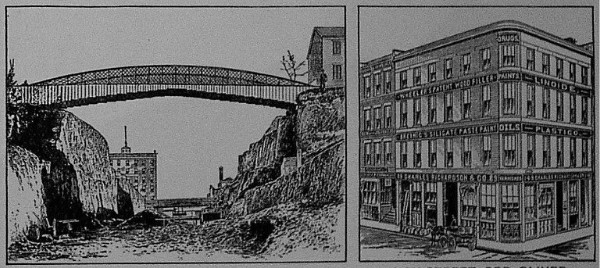
HIGH STREET BRIDGE,
OVER OLIVER
HIGH STREET, COR. OLIVER.
THEN AND NOW.
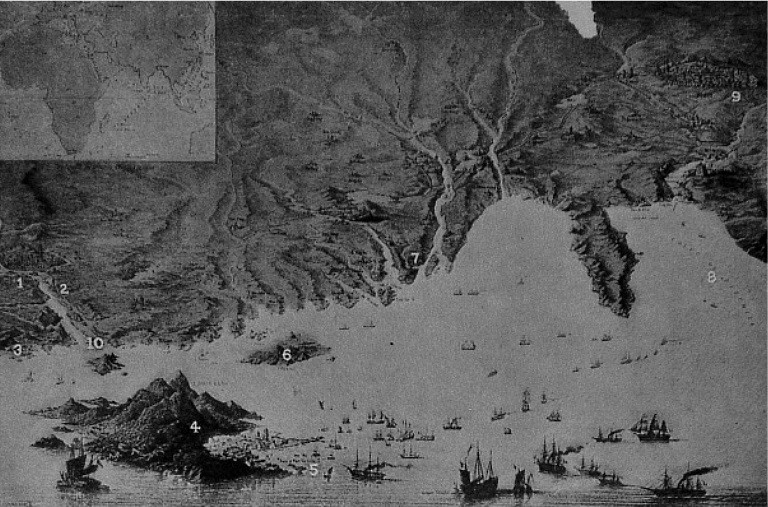
From a print
Collection of State Street Trust Co.
Showing the ports of Hong Kong, Canton, Whampoa, Lintin, Macao, and other ports so well known to the Boston merchants in the old shipping days. 1 Canton 2 Whampoa 3 Macao 4 Hong Kong 5 Victoria 6 Formosa 7 Shanghai 8 Golfe de Petchili 9 Pekin 10 Lintin
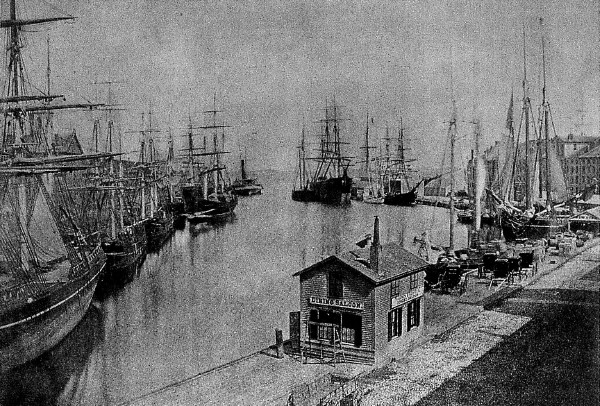
From a photograph
Kindness of F. B. C. Bradlee
INDIA WHARF IN 1857